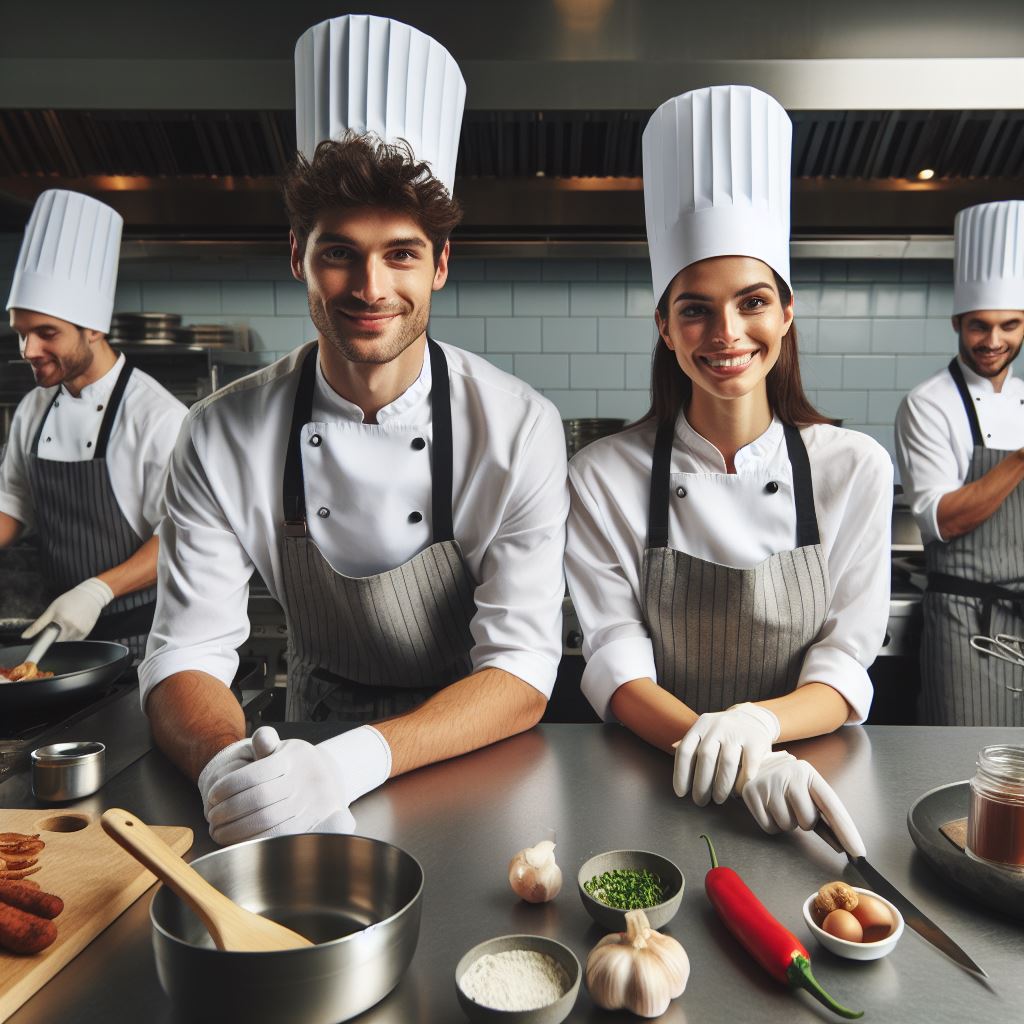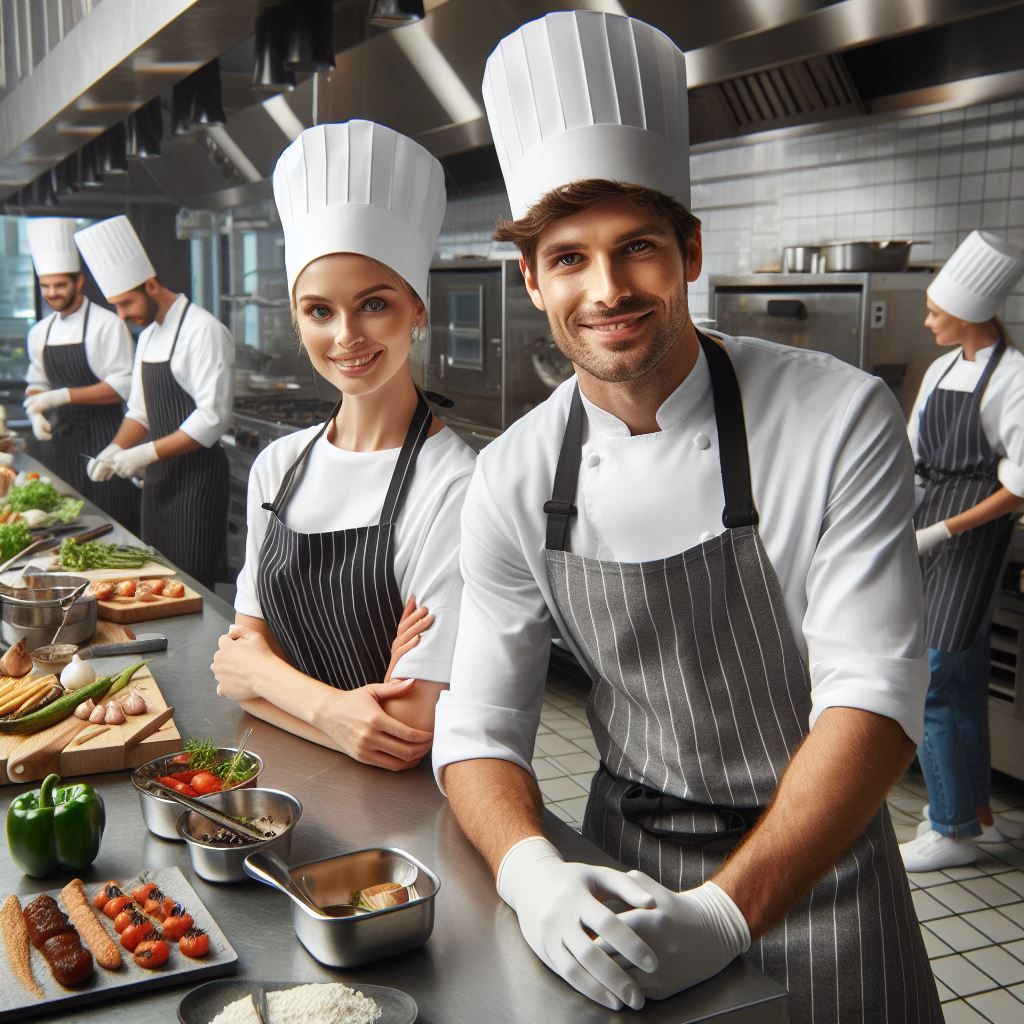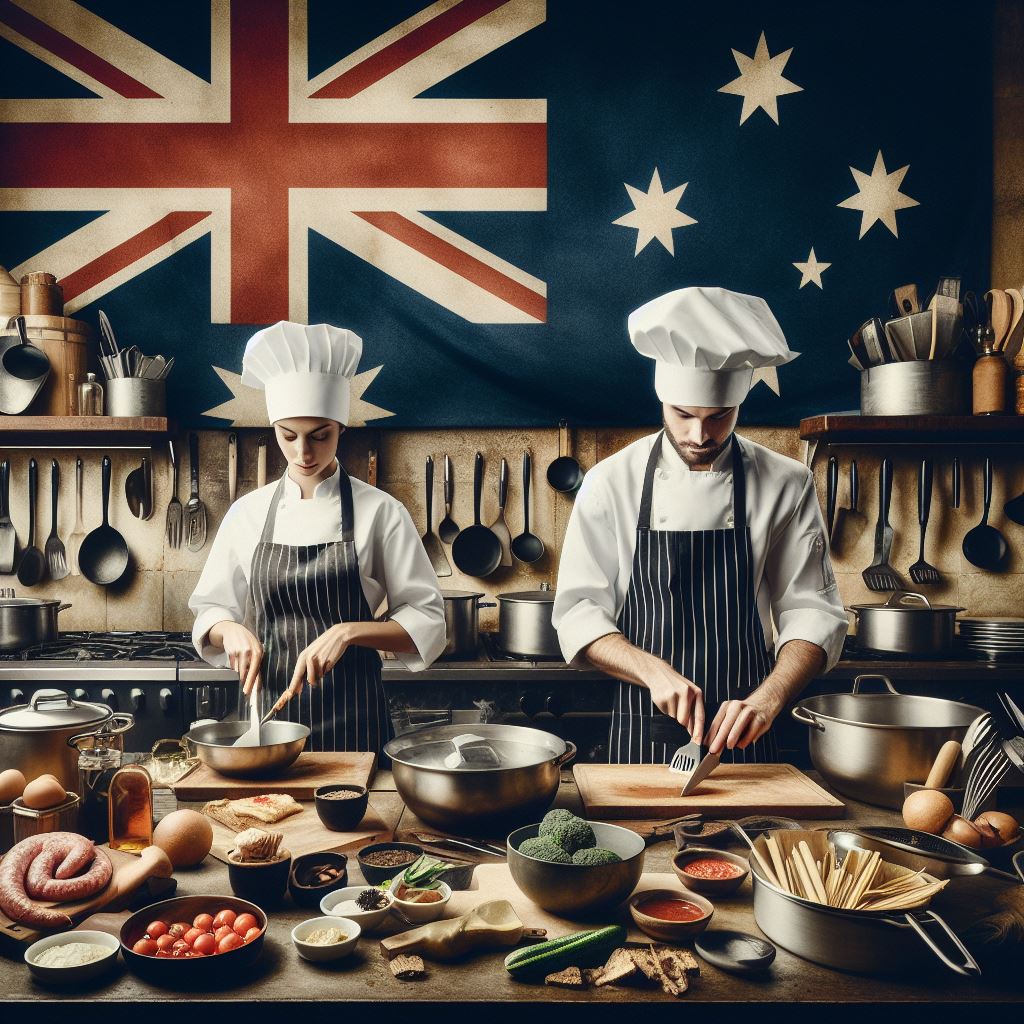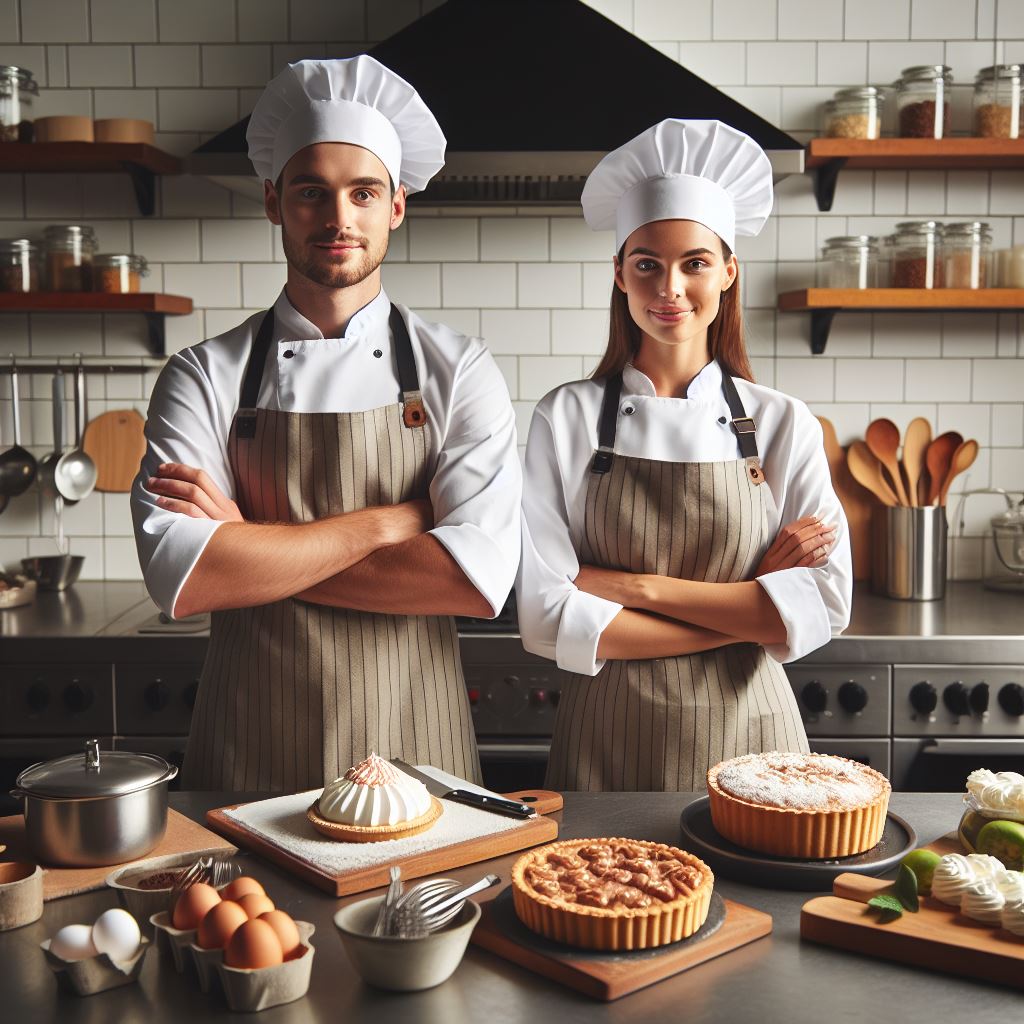Introduction
Welcome to a day in the life of a Sydney-based cook, where culinary passion meets city vibrancy. From dawn to dusk, the kitchen orchestrates flavors, creativity, and dedication.
As the sun rises, the kitchen hums with coffee and bacon aromas. Cooks prepare amid palpable energy.
Donning apron and hat, the cook tackles tasks, hands washed, ingredients gathered, and tools organized.
The kitchen buzzes with sizzling pans and chopping knives amid the morning rush.
Throughout the day, the cook crafts dishes with precision, slicing, whisking, and searing ingredients.
Collaboration ensures each plate is a masterpiece, with seamless communication and culinary excellence.
The day ends with reflection, fueled by the kitchen’s adrenaline rush, igniting passion for culinary creation.
Anticipation fills the air as the cook looks forward to tomorrow’s fresh opportunities.
Join us to unravel the life of a Sydney-based cook, from hustle to calm, in dynamic kitchens.
Embark on a culinary journey where dedication and creativity converge to create unforgettable dining experiences.
In Sydney’s heart, cooks bring joy and innovation, enriching the city’s vibrant food scene.
Overview of Sydney’s culinary scene
Sydney as a foodie destination
Sydney has become a top destination for food enthusiasts, offering a vibrant culinary scene that caters to all tastes and preferences.
The city is home to an array of renowned restaurants, cafes, and food markets, providing locals and tourists with an array of options for dining out.
Bustling with activity, Sydney’s food scene showcases a fusion of international cuisines, making it a haven for food lovers seeking diverse culinary experiences.
Variety of cuisines available
From fine dining establishments offering French, Italian, and Asian cuisines to casual eateries serving up traditional Australian fare, Sydney has it all.
Your Personalized Career Strategy
Unlock your potential with tailored career consulting. Get clear, actionable steps designed for your success. Start now!
Get StartedYou can indulge in freshly caught seafood at the famous Sydney Fish Market or explore the vibrant Chinatown for delicious Chinese and Asian street food.
For those craving exotic flavors, there are numerous Indian, Thai, Mexican, and Middle Eastern restaurants ready to satisfy any palate.
Sydney’s multiculturalism and diverse population contribute to the city’s culinary landscape, creating a melting pot of flavors and culinary traditions.
Importance of skilled cooks in the industry
Behind the scenes, skilled cooks play a crucial role in Sydney’s culinary industry, ensuring that each dish is prepared to perfection.
The demand for talented chefs and cooks is high, as restaurants strive to deliver exceptional dining experiences to their customers.
These culinary professionals not only possess exceptional cooking skills but also bring creativity, innovation, and passion to their craft.
Their ability to transform ingredients into tantalizing dishes contributes significantly to the overall reputation and success of Sydney’s food scene.
Skilled cooks are continually pushing boundaries, experimenting with flavors, and incorporating new techniques to create unique culinary masterpieces.
Their dedication and expertise elevate the dining experience and keep Sydneysiders and tourists coming back for more.
Therefore, Sydney’s culinary scene is an exciting and dynamic world that caters to the diverse tastes and preferences of food enthusiasts.
From its eclectic mix of restaurants offering various cuisines to the skilled cooks behind each dish, Sydney has firmly established itself as a foodie destination.
Whether you crave authentic Italian pasta, spicy Thai curry, or fresh Australian seafood, you can find it all in this vibrant city.
So next time you find yourself in Sydney, be sure to explore its culinary treasures and indulge in a day filled with delectable flavors and gastronomic delights.
Morning routine
Wake-up time and preparation
Every morning, I wake up at 5:30 am and begin my day as a Sydney-based cook. I start by stretching and doing some exercises to energize my body. Then, I head to the bathroom to freshen up and get ready for the long day ahead in the kitchen.
Stand Out with a Resume That Gets Results
Your career is worth more than a generic template. Let us craft a resume and cover letter that showcase your unique strengths and help you secure that dream job.
Get HiredTravel to the workplace
After my morning routine, I gather my belongings and leave my house at 6:00 am. I live in the suburbs of Sydney, so I need to take public transportation to reach my workplace in the bustling city center.
the hop on the train and use this time to mentally prepare for the day ahead.
I review the recipes I will be working on and think about any special requests or dietary restrictions.
Arrival at the kitchen
At 7:00 am, I arrive in the kitchen greeted by the aroma of coffee and bacon. Colleagues bustling, I prepare for the day. I wear my apron and hat, ready for action.
I wash my hands and gather ingredients meticulously. At my station, I organize tools and equipment efficiently. Orders come in, signaling the morning rush. Slicing, whisking, searing—I execute tasks precisely.
The kitchen resonates with rhythmic sounds. Collaboration with fellow chefs ensures flawless dishes. By morning’s end, I feel accomplished. The rush fuels my passion for cooking. Tomorrow promises new challenges and opportunities.
Preparing for the day
Checking the daily menu
Every day, as a Sydney-based cook, I start my day by checking the daily menu. This allows me to plan and prioritize my tasks for the day.
Organizing ingredients and tools
Once I know what dishes will be prepared, I gather all the necessary ingredients and tools. This ensures a smooth workflow and avoids any last-minute chaos.
Communicating with the team
As part of a team, effective communication is crucial. I touch base with my fellow cooks and the chef, discussing tasks and coordinating our efforts for the day.
Checking the daily menu
Before starting my work, I carefully go through the daily menu. This includes appetizers, main courses, desserts, and any special requests from the customers.
This helps me understand the complexity of the dishes, the cooking techniques required, and the time needed for preparation.
By familiarizing myself with the menu, I can plan and organize my day efficiently.
Organizing ingredients and tools
Once I have a clear understanding of the menu, I start organizing the ingredients and tools required for each dish.
I check the inventory to ensure that all the necessary ingredients are available.
If something is missing, I inform the chef or make arrangements to obtain it as soon as possible.
I also inspect and sharpen my knives, arrange pots and pans, and ensure the cooking stations are clean and ready to use.
This organized setup saves time and reduces the chances of mistakes during the cooking process.
Communicating with the team
As a team player, I believe communication is the key to a successful day in the kitchen.
Transform Your LinkedIn for Maximum Impact
Elevate your professional brand with a LinkedIn profile that attracts recruiters, showcases your expertise, and maximizes opportunities. Stand out in your industry with a profile built for success.
Boost ProfileBefore starting our shifts, we gather for a quick team meeting to discuss the menu, assigned tasks, and any updates.
During the day, we constantly communicate with each other, sharing progress or seeking assistance when needed.
This level of communication ensures a well-coordinated workflow and helps us serve delicious food on time.
Overall, preparing for the day involves checking the menu, organizing ingredients and tools, and communicating with the team.
By following these steps, I can efficiently navigate through the day’s tasks and ensure a seamless cooking experience as a Sydney-based cook.
Read: The Role of Tech in Modern Travel Agencies
Kitchen operations during service
Roles and responsibilities
- Prep work – Ensuring all ingredients are prepped and ready for cooking.
- Cooking stations – Each cook is assigned a specific station to prepare and cook dishes.
- Plating and garnishing – Ensuring the finished dish is presented beautifully before being served.
Cooperation and coordination among cooks
During service, teamwork and communication are crucial for a smooth operation.
Each cook must work together and coordinate their tasks to ensure efficiency.
High-pressure environment and time management
Working as a cook in a Sydney-based kitchen can be intense and fast-paced.
Time management is key to ensure all dishes are prepared and served on time.
In the midst of a hectic service, being able to stay calm and focused is essential.
The pressure can be overwhelming, but it pushes the cooks to perform at their best.
Every second counts, and each cook must prioritize tasks and work efficiently.
Being able to multitask and prioritize is crucial in this high-pressure environment.
Communication is also vital, as it helps coordinate the timing of dishes and avoids delays.
Each cook must be aware of the progress of other dishes to ensure everything comes together seamlessly.
There is a sense of camaraderie among the cooks, as they rely on each other to succeed.
They assist and support one another to meet the demands of a busy service.
In summary, a day in the life of a Sydney-based cook during service involves various roles and responsibilities.
Prep work, cooking stations, and plating all contribute to the smooth running of the kitchen.
Cooperation and coordination among cooks create an efficient and harmonious environment.
The high-pressure nature of the job requires excellent time management and the ability to handle stress.
Despite the challenges, the fast-paced environment and teamwork foster a sense of accomplishment.
Being a cook in Sydney is demanding but also rewarding, as they create delicious dishes that satisfy customers.
Read: Navigating COVID-19: Travel Agents’ Advice
Dealing with challenges
Managing unexpected situations
Last-minute menu changes
- Adjusting recipes and ingredients on the spot leads to quick thinking and adaptation.
- Communicating changes to the kitchen staff ensures a smooth workflow and prevents errors.
Rush hours and maintaining quality
- Keeping calm under pressure helps to handle the influx of orders efficiently.
- Prioritizing tasks and organizing the kitchen ensures that food is served with the same level of quality.
Problem-solving skills
- Analyzing the situation and identifying the root cause of any kitchen issues allows for effective problem-solving.
- Quick decision-making abilities help to address challenges promptly and minimize disruptions.
- Collaborating with team members to brainstorm solutions enhances problem-solving outcomes.
Team communication and support
- Maintaining open lines of communication among the kitchen staff ensures everyone is on the same page.
- Providing clear instructions and feedback helps to prevent misunderstandings and improve performance.
- Supporting and motivating team members fosters a positive work environment and boosts productivity.
Managing unexpected situations
Dealing with challenges is an integral part of being a Sydney-based cook. The fast-paced nature of the culinary industry often presents unexpected situations that require quick thinking and adaptability.
One common challenge that cooks face is last-minute menu changes. Whether it’s due to special dietary requirements or ingredient availability, adjusting recipes and ingredients on the spot is essential.
This requires the ability to think on their feet and make necessary modifications. Effective communication with the kitchen staff is crucial in ensuring a smooth workflow and preventing errors.
Another challenge is managing rush hours while maintaining the quality of dishes. During peak times, such as weekends or special events, the kitchen may experience a high volume of orders.
Remaining calm and composed under pressure is essential to handle the influx of orders efficiently. Prioritizing tasks and organizing the kitchen layout helps to ensure that food is served with the same level of quality, even during busy periods.
Problem-solving skills
Problem-solving skills are also paramount for a Sydney-based cook. Analyzing the situation and identifying the root cause of any kitchen issues allows for effective problem-solving.
This could range from a malfunctioning kitchen equipment to a sudden shortage of ingredients. The ability to make quick decisions is crucial in addressing challenges promptly and minimizing disruptions.
Collaboration with team members to brainstorm solutions enhances problem-solving outcomes.
Team communication and support
In addition, team communication and support play a vital role in overcoming challenges. Maintaining open lines of communication among the kitchen staff ensures that everyone is aware of changes, updates, and priorities.
Providing clear instructions and constructive feedback to team members helps to prevent misunderstandings and improves overall performance. Supporting and motivating team members fosters a positive work environment and boosts productivity, even in challenging situations.
Overall, dealing with challenges requires a combination of quick thinking, problem-solving skills, and effective team communication.
By successfully managing unexpected situations, Sydney-based cooks can deliver high-quality dishes and create exceptional dining experiences for their customers.
Read: Travel Insurance Tips from Expert Agents

Lunch break
After a hectic morning in the kitchen, it’s finally time for a well-deserved lunch break.
Brief rest and refueling
I quickly wash my hands, remove my apron, and head towards the staff dining area.
The lunch break is not only a time to refuel my body but also a chance to relax and unwind.
I find a comfortable spot at a table, away from the hustle and bustle of the kitchen.
Sharing meals with colleagues
As I dig into my packed lunch, I notice my colleagues gathering around the communal table.
We have a strong sense of camaraderie in the kitchen, and lunchtime is when we bond over food.
Everyone brings something different to the table, quite literally.
There are dishes from various cuisines and cultures, reflecting the diversity of our team.
We happily share our meals, tasting a bit of everything and exchanging stories and recipes.
Discussing the shift and planning for the rest of the day
While enjoying the delicious food, we also discuss the events of the morning shift.
We share our successes, challenges, and any memorable moments that occurred during service.
This informal debrief allows us to learn from each other and improve our skills as a team.
As we finish our meals, our conversation shifts towards the plans for the rest of the day.
We discuss the upcoming orders, the special requests, and any changes in the menu.
Together, we strategize on how to tackle the tasks efficiently while ensuring top-notch quality.
Our lunch break not only serves as a time to relax but also as a valuable planning session.
With our stomachs satisfied and minds refreshed, we return to the kitchen with renewed energy.
Ready to tackle the challenges of the rest of the day with enthusiasm and passion.
As a Sydney-based cook, my lunch break is not merely a meal but a vital part of my day.
It allows for bonding with colleagues, sharing cultural experiences, and preparing for success.
So, if you ever wonder what cooks do during their lunch break, now you know.
We refuel our bodies, connect with our team, and set ourselves up for a productive day in the kitchen.
Read: Top 10 Destinations Aussie Agents Love
Afternoon tasks
Cleaning and organizing the kitchen
Once the lunch rush is over, I begin cleaning and organizing the kitchen. I systematically wipe down the countertops, scrub the stovetop, and sanitize all the cooking utensils. Every surface must be spotless, ensuring a clean and safe working environment.
Inventory check
Next, I conduct an inventory check to ensure we have enough supplies for the upcoming days. I meticulously go through the pantry, refrigerator, and freezer, taking note of any items that need restocking. This helps me avoid any last-minute surprises during the dinner service.
Meal prep for the next day
After verifying inventory, I commence meal prepping: chopping vegetables, marinating meat, and preparing sauces for the next day’s rush. Organization and preparation maintain kitchen efficiency and ensure customer satisfaction.
Cleaning and organizing prevent cross-contamination and ensure a clean workspace. I gather supplies and scrub surfaces meticulously. Sanitizing utensils and equipment, including ovens, is crucial. Inventory checks aid in planning ingredient orders and prevent shortages.
I inspect pantry shelves, discard expired items, and organize refrigerated goods. Meal prepping streamlines cooking processes for timely service. Reviewing the menu, I create a prep list and portion ingredients.
Washing, chopping, and labeling ingredients ensure readiness. Completing these tasks ensures a well-functioning kitchen and delicious meals for customers.
Read: Why Use a Travel Agent for Business Trips?
Find Out More: Culinary Trends in Australia’s Top Restaurants
Improving culinary skills
Continuous learning and development
As a Sydney-based cook, I am constantly striving to improve my culinary skills through continuous learning and development. Every day presents an opportunity for growth.
I attend workshops, seminars, and cooking classes to acquire new knowledge, techniques, and trends in the culinary world.
By staying updated with the latest culinary advancements, I ensure that my recipes and cooking methods are up-to-date and appealing to my customers.
Learning from experienced chefs and industry experts broadens my horizons, allowing me to adopt innovative practices and implement them in my own cooking.
Through continuous learning, I am not only expanding my repertoire of recipes but also enhancing my overall culinary expertise.
Experimenting with new recipes and techniques
While my tried and tested recipes are popular among customers, I understand the importance of creativity and innovation in the culinary field.
I constantly experiment with new recipes and techniques to push the boundaries of flavor and presentation.
This experimentation allows me to create unique dishes that surprise and delight both regulars and newcomers to my restaurant.
By experimenting with diverse ingredients and fusion cuisines, I can offer an exciting and memorable dining experience.
Additionally, I incorporate modern cooking techniques such as sous vide, molecular gastronomy, and smoking to elevate the flavors of traditional dishes.
Experimentation keeps my menu fresh and exciting, ensuring that customers return for more culinary adventures.
Seeking feedback and mentorship
To further develop my culinary skills, I actively seek feedback from my customers, as well as trusted mentors.
Customer feedback allows me to understand their preferences, identify areas for improvement, and tailor my dishes accordingly.
Receiving constructive criticism helps me refine my cooking techniques and enhances the overall quality of my food.
I also seek mentorship from experienced chefs who provide valuable guidance and insights into the industry.
Having a mentor allows me to learn from their experiences, avoid common pitfalls, and gain a better understanding of the business side of cooking.
Mentorship provides me with the necessary tools and knowledge to navigate challenges and excel in my culinary career.
By embracing feedback and mentorship, I continually strive to reach new heights in my culinary journey and provide the best dining experience for my customers.
In general, improving culinary skills is essential for a Sydney-based cook. Continuous learning, experimenting with new recipes and techniques, and seeking feedback and mentorship are crucial elements in the pursuit of culinary excellence.
By engaging in these practices, I ensure that I am at the forefront of culinary trends, offering unique and exciting dishes that keep my customers coming back for more.
Uncover the Details: Top 10 Event Trends in Australia for 2024
Work-life balance
As a Sydney-based cook, balancing work and personal life is crucial for my overall well-being and happiness. Here are some reasons why maintaining a work-life balance is important:
Importance of downtime
- Taking breaks and having downtime allows me to recharge and rejuvenate.
- It helps prevent burnout and allows me to be more productive when I return to work.
- Downtime also gives me the opportunity to spend quality time with family and friends.
Pursuing hobbies and personal growth
- Engaging in hobbies and personal interests outside of work contributes to a fulfilling and well-rounded life.
- Pursuing hobbies allows me to relax, be creative, and learn new skills.
- It gives me a sense of accomplishment and boosts my self-esteem.
Challenges and strategies for maintaining balance
- Long working hours and demanding schedules can make it challenging to find time for personal life.
- Setting boundaries and prioritizing tasks help me manage my time effectively.
- Learning to delegate tasks and asking for help when needed allows me to reduce stress and maintain balance.
- Creating a routine and sticking to it helps in managing both work and personal commitments.
Maintaining work-life balance requires a conscious effort and a few strategies
Time management
- Prioritizing tasks based on urgency and importance helps me stay organized.
- Setting realistic goals and deadlines ensures I don’t overload myself with work.
Communication
- Open and honest communication with colleagues and superiors about workload and personal obligations helps in finding solutions together.
- Clear communication with family and friends about my work schedule helps manage expectations and allows for support.
Self-care
- Taking care of my physical and mental well-being is crucial.
- Regular exercise, proper nutrition, and enough sleep help me stay energized and focused.
Flexibility and adaptability
- Being open to adjustments in schedules and being flexible allows me to accommodate both work and personal needs.
- Embracing technology and remote work options can also provide more flexibility in managing work-life balance.
Embracing downtime
- Taking regular breaks during work hours helps me maintain focus and productivity.
- Using weekends and time off to engage in activities I enjoy rejuvenates me for the coming week.
Learning to say no
- Setting healthy boundaries and learning to say no when necessary ensures that I don’t overcommit and exhaust myself.
- Prioritizing my own well-being and happiness is essential in maintaining a healthy work-life balance.
Ultimately, as a Sydney-based cook, work-life balance plays a crucial role in ensuring my overall well-being and happiness. It is important to understand the significance of downtime, pursue hobbies, and implement strategies to maintain balance amidst challenges.
By prioritizing self-care, effective time management, and open communication, it is possible to achieve a fulfilling and well-rounded life.
Uncover the Details: Tour Guide Training: What to Expect?
Learn More: Navigating Australia’s Liquor Laws for Bartenders
Discover More: Seafood Specialties: Aussie Cooks’ Delight
Conclusion
Recap of a day in the life of a Sydney-based cook
In closing, a day in the life of a Sydney-based cook is filled with hard work and dedication. From early morning prep work to late-night clean up, every moment is spent honing their craft.
The long hours, physically demanding tasks, and constant pressure to deliver exceptional dishes can be challenging, but the satisfaction of creating delicious meals and making people happy makes it all worthwhile.
Appreciation for the hard work and dedication
As we appreciate the hard work and dedication of Sydney-based cooks, it is important to acknowledge the culinary industry as a whole. It takes a village to run a successful kitchen, with each member playing a vital role in creating a memorable dining experience.
From the talented chefs and sous chefs to the hardworking kitchen staff, everyone contributes to the magic that happens behind the scenes.
Encouragement for aspiring cooks and appreciation for the culinary industry.
To aspiring cooks, take heart in knowing that your passion for food and cooking can lead to a fulfilling career. The culinary industry offers endless opportunities for growth, creativity, and learning.
Embrace the challenges, push yourself to constantly improve, and don’t be afraid to take risks. The journey may be tough, but the rewards are immeasurable.
In conclusion, let us appreciate and celebrate the incredible work of Sydney-based cooks, who bring joy to our palates and create unforgettable dining experiences.
Their dedication and love for their craft deserve our utmost respect. So next time you savor a delicious meal, take a moment to appreciate the hard work, skill, and passion that went into creating it.




